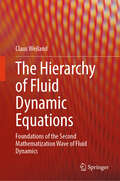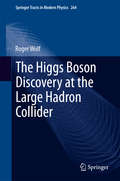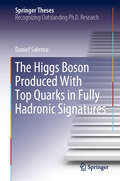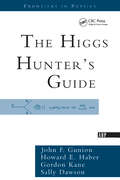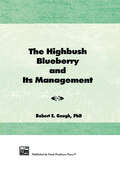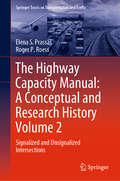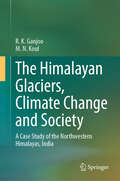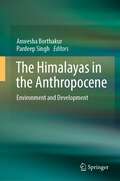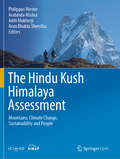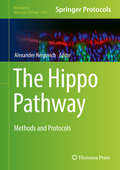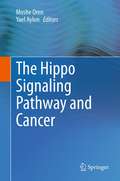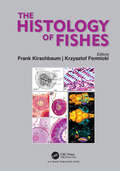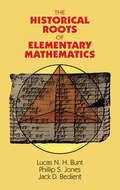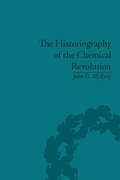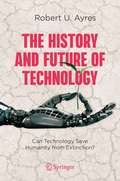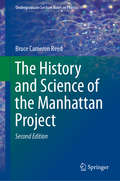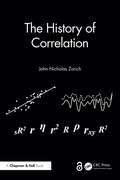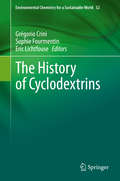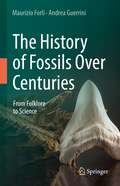- Table View
- List View
The Hierarchy of Fluid Dynamic Equations: Foundations of the Second Mathematization Wave of Fluid Dynamics
by Claus WeilandThis book is devoted to the most general governing equations of the fluid mechanics, namely the Navier-Stokes equations and their derivatives. These equations are presented in various manners: for several coordinate systems, for laminar and turbulent flows, for different thermodynamic states of gases, in dimensional and non-dimensional forms, and in an incompressible situation. All that is valid also for the different versions of the Navier-Stokes equations, where appropriate. The only way to solve the fluid dynamic equations for complex three-dimensional problems consists in the use of numerical integration methods. To deal with this request it is very helpful to formulate the complete set of governing equations in vector or vector-matrix form. This is true also for two equations turbulence models as well as for the description of non-equilibrium effects of thermodynamics. These requirements are fully addressed in this book. Graduate and doctoral students, who are concerned with the numerical solutions of the fluid dynamic equations for specific problems, may find in this book the suggestions regarding the degree of approximation which could be adequate for the task they consider. Further, persons who are interested in the evolution of the mathematical description of fluid dynamic issues, both from the scientific and also the historical side, may discover suggestions, advices and motivations in this book.
The Higgs Boson Discovery at the Large Hadron Collider
by Roger WolfThis book provides a comprehensive overview of the field of Higgs boson physics. It offers the first in-depth review of the complete results in connection with the discovery of the Higgs boson at CERN's Large Hadron Collider and based on the full dataset for the years 2011 to 2012. The fundamental concepts and principles of Higgs physics are introduced and the important searches prior to the advent of the Large Hadron Collider are briefly summarized. Lastly, the discovery and first mensuration of the observed particle in the course of the CMS experiment are discussed in detail and compared to the results obtained in the ATLAS experiment.
The Higgs Boson Produced With Top Quarks in Fully Hadronic Signatures (Springer Theses)
by Daniel SalernoThe work presented in this PhD dissertation is the first search at CMS for Higgs bosons produced in association with top quarks (ttH) in a final state consisting of only jets. The results presented in this book uncover a new class of ttH events that will help us elucidate our understanding of the Yukawa sector interactions between the Higgs boson and the top quark. Despite this being the most common decay signature for ttH, a large contamination of SM backgrounds makes it the most challenging for extracting a signal from data. The PhD thesis presents many sophisticated tools and techniques that were developed in order to overcome these challenges. These tools pave the way for future analyses to investigate other standard model and beyond-standard model physics.
The Higgs Hunter's Guide (Frontiers in Physics)
by John F. GunionThe Higgs Hunter's Guide is a definitive and comprehensive guide to the physics of Higgs bosons. In particular, it discusses the extended Higgs sectors required by those recent theoretical approaches that go beyond the Standard Model, including supersymmetry and superstring-inspired models.
The High-Mountain Cryosphere
by John J. Clague Huggel, Christian and Carey, Mark and Clague, John J. and Kääb, Andreas Christian Huggel Mark Carey Andreas KääbThis edited volume, showcasing cutting-edge research, addresses two primary questions - what are the main drivers of change in high-mountains and what are the risks implied by these changes? From a physical perspective, it examines the complex interplay between climate and the high-mountain cryosphere, with further chapters covering tectonics, volcano-ice interactions, hydrology, slope stability, erosion, ecosystems, and glacier- and snow-related hazards. Societal dimensions, both global and local, of high-mountain cryospheric change are also explored. The book offers unique perspectives on high-mountain cultures, livelihoods, governance and natural resources management, focusing on how global change influences societies and how people respond to climate-induced cryospheric changes. An invaluable reference for researchers and professionals in cryospheric science, geomorphology, climatology, environmental studies and human geography, this volume will also be of interest to practitioners working in global change and risk, including NGOs and policy advisors.
The Highbush Blueberry and Its Management
by Robert E GoughHere is a book that sets forth vital information growers need to produce highbush blueberries effectively and efficiently. Written from the grower?s point of view, The Highbush Blueberry and Its Management presents technical information in a highly readable manner that is easy to understand. It helps growers make proper decisions before they plant-
The Highway Capacity Manual: Signalized and Unsignalized Intersections (Springer Tracts on Transportation and Traffic #12)
by Elena S. Prassas Roger P. RoessSince 1950, the Highway Capacity Manual has been a standard used in the planning, design, analysis, and operation of virtually any highway traffic facility in the United States. It has also been widely used around the globe and has inspired the development of similar manuals in other countries. This book is Volume II of a series on the conceptual and research origins of the methodologies found in the Highway Capacity Manual. It focuses on the most complex points in a traffic system: signalized and unsignalized intersections, and the concepts and methodologies developed over the years to model their operations. It also includes an overview of the fundamental concepts of capacity and level of service, particularly as applied to intersections. The historical roots of the manual and its contents are important to understanding current methodologies, and improving them in the future. As such, this book is a valuable resource for current and future users of the Highway Capacity Manual, as well as researchers and developers involved in advancing the state-of-the-art in the field.
The Himalayan Glaciers, Climate Change and Society: A Case Study of the Northwestern Himalayas, India
by R. K. Ganjoo M. N. KoulThis book provides detailed information on the Northwestern Himalayas in India. The scientific data compiled in the book is based on more than two decades of field and laboratory studies by the authors. The Ladakh region is a well-known cold desert with unique geological and climatic setting. The influence of Westerlies in the region has played significant role in the Ladakh region to behave much differently than rest of the Himalaya. The “Karakorum Anomaly” has been a key factor in negating the effect of global climate change in this region of Himalaya. The scientific discussion of some major glaciers of the region, as case study, are also discussed in this book. The uniqueness of the region with respect to climate shall be elaborated with the help of case studies.
The Himalayas in the Anthropocene: Environment and Development
by Pardeep Singh Anwesha BorthakurThis book aims to provide a comprehensive overview of the current challenges in one of the most biodiverse regions in the world. Environmental sustainability and climate change implications in the mountain ecosystems in general and mountainous regions of the Global South in particular are key concerns of the present-day world. In particular, the mountainous regions in the Global South are excessively being subjected to haphazard developmental activities making them vulnerable to all possible aspects of climate change. Ecologically fragile and biodiversity-rich (considered ‘hotspot’ of biodiversity) Himalayan Region (HR) is subjected to high vulnerability due to climate change and unsustainable developmental activities. A major portion of the Indian HR, for instance, has gradually been endangered by intense environmental burden owing to rapid and haphazard urbanization, extreme weather events, etc. Unfortunately, environmental sustainability studies in many parts of the region are still inadequate. Accordingly, in this book, the authors provide a detailed account of the Himalayas in the epoch of Anthropocene—“the most recent period in Earth’s history when human activity started to have a significant impact on the planet’s climate and ecosystems" (as defined by the National Geographic Society). It is no secret that the haphazard developmental activities in the Himalayas are having tremendous impacts on the local ecosystems. Many of such impacts are irreversible over the next hundreds of years and it should ring an alarm to all of us alike. Therefore, it becomes increasingly imperative that we document the existing anthropogenic challenges in the Himalayas, analyse them and find a way where environment and development can go hand in hand. This book is an attempt in that direction. The authors aim to address issues ranging from unorganized tourism practices to the big dams in the Himalayas and from mining and quarrying activities to climate change implications and sustainable development goals (SDGs).
The Hindu Kush Himalaya Assessment: Mountains, Climate Change, Sustainability and People
by Philippus Wester Arabinda Mishra Aditi Mukherji Arun Bhakta ShresthaThis open access volume is the first comprehensive assessment of the Hindu Kush Himalaya (HKH) region. It comprises important scientific research on the social, economic, and environmental pillars of sustainable mountain development and will serve as a basis for evidence-based decision-making to safeguard the environment and advance people’s well-being. The compiled content is based on the collective knowledge of over 300 leading researchers, experts and policymakers, brought together by the Hindu Kush Himalayan Monitoring and Assessment Programme (HIMAP) under the coordination of the International Centre for Integrated Mountain Development (ICIMOD). This assessment was conducted between 2013 and 2017 as the first of a series of monitoring and assessment reports, under the guidance of the HIMAP Steering Committee: Eklabya Sharma (ICIMOD), Atiq Raman (Bangladesh), Yuba Raj Khatiwada (Nepal), Linxiu Zhang (China), Surendra Pratap Singh (India), Tandong Yao (China) and David Molden (ICIMOD and Chair of the HIMAP SC).This First HKH Assessment Report consists of 16 chapters, which comprehensively assess the current state of knowledge of the HKH region, increase the understanding of various drivers of change and their impacts, address critical data gaps and develop a set of evidence-based and actionable policy solutions and recommendations. These are linked to nine mountain priorities for the mountains and people of the HKH consistent with the Sustainable Development Goals. This book is a must-read for policy makers, academics and students interested in this important region and an essentially important resource for contributors to global assessments such as the IPCC reports.
The Hippo Pathway: Methods And Protocols (Methods in Molecular Biology #1893)
by Alexander HergovichThis detailed book covers numerous expert methodologies to examine Hippo signaling on the structural, molecular, cellular, and organismal level. Beginning with a section on Drosophila genetics, the volume continues with parts exploring molecular and cell biological studies of the Hippo pathway, the use of structural biology and biochemistry, and a brief look at the Hippo pathway in mouse models. Written for the highly successful Methods in Molecular Biology series, chapters contain introductions to their respective topics, lists of the necessary materials and reagents, step-by-step, readily reproducible laboratory protocols, and tips on troubleshooting and avoiding known pitfalls. Comprehensive and practical, The Hippo Pathway: Methods and Protocols equips newcomers and specialists alike with key methodologies to accurately define the status of Hippo signaling in their experimental settings.
The Hippo Signaling Pathway and Cancer
by Moshe Oren Yael AylonThe Hippo signaling pathway is rapidly gaining recognition as an important player in organ size control and tumorigenesis, and many leading scientists are showing increased interest in this growing field and it's relation to cancer. For instance, for the past two years, over 60 researchers from all over the world, have gathered annually for an intensive "Hippo Pathway Workshop" in Rome, Italy. This year, the workshop has been sponsored by Keystone Symposium and will be held in Monterey, California in Spring, 2013.This confirms the growing interest for the Hippo field within the international scientific community. The prospective list of the chapters covers virtually all aspects of tumor biology. This is because members of the Hippo Pathway have been associated with numerous well-established cell signaling pathways, just to name a few; Ras, Wnt, TGFbeta and p53. Moreover, Hippo signaling is not solely involved in regulating "classic" tumor characteristics such as cell proliferation, survival and growth, but is also diversely involved in cell-autonomous and non-cell-autonomous differentiation, migration and organ size control. The primary audience are researchers interested in basic science in the areas of tumor suppression, cell cycle and size regulation, development and differentiation.
The Histology of Fishes
by Frank Kirschbaum Krzysztof FormickiThe book is a multi-authored book of 18 chapters comprising the state of the art work of all relevant topics on modern fish histology from 28 authors from ten countries. The topics include Introduction to Histological Techniques, Integument, Fish Skeletal Tissues, Muscular System, Structure and Function of Electric Organs, Digestive System, Glands of the Digestive Tract, Swim Bladder, Kidney, Ovaries and Eggs, Egg Envelopes, Testis Structure, Spermatogenesis, and Spermatozoa in Teleost Fishes, Cardiovascular System and Blood, Immune System of Fish, Gills: Respiration and Ionic-Osmoregulation, Sensory Organs, Morphology and Ecomorphology of the Fish Brain, and Endocrine System. Structural and functional aspects are treated and in a comparative way fish diversity at various taxonomic levels is integrated.
The Historical Roots of Elementary Mathematics
by Lucas N. Bunt Jack D. Bedient Phillip S. Jones"Will delight a broad spectrum of readers." -- American Mathematical MonthlyDo long division as the ancient Egyptians did! Solve quadratic equations like the Babylonians! Study geometry just as students did in Euclid's day! This unique text offers students of mathematics an exciting and enjoyable approach to geometry and number systems. Written in a fresh and thoroughly diverting style, the text -- while designed chiefly for classroom use -- will appeal to anyone curious about mathematical inscriptions on Egyptian papyri, Babylonian cuneiform tablets, and other ancient records.The authors have produced an illuminated volume that traces the history of mathematics -- beginning with the Egyptians and ending with abstract foundations laid at the end of the 19th century. By focusing on the actual operations and processes outlined in the text, students become involved in the same problems and situations that once confronted the ancient pioneers of mathematics. The text encourages readers to carry out fundamental algebraic and geometric operations used by the Egyptians and Babylonians, to examine the roots of Greek mathematics and philosophy, and to tackle still-famous problems such as squaring the circle and various trisectorizations.Unique in its detailed discussion of these topics, this book is sure to be welcomed by a broad range of interested readers. The subject matter is suitable for prospective elementary and secondary school teachers, as enrichment material for high school students, and for enlightening the general reader. No specialized or advanced background beyond high school mathematics is required.
The Historiography of the Chemical Revolution: Patterns of Interpretation in the History of Science
by John G McEvoyThis study offers a critical survey of past and present interpretations of the Chemical Revolution designed to lend clarity and direction to the current ferment of views.
The Historiography of the First Russian Antarctic Expedition, 1819–21
by Rip BulkeleyThis book looks at the different ways in which Russian historians and authors have thought about their country’s first Antarctic expedition (1819-21) over the past 200 years. It considers the effects their discussions have had on Russia’s Antarctic policy and may yet have on Antarctica itself. In particular, it examines the Soviet decision in 1949, in line with the cultural policies of late Stalinism, to revise the traditional view of the expedition in order to claim that it was Russian seamen that first sighted the Antarctic mainland in January 1820; this claim remains the official position in Russia today. The author illustrates, however, that the case for such a claim has never been established, and that attempts to make it damaged the work of successive Russian historians. Providing a timely assessment of Russian historiography of the Bellingshausen expedition and examining the connections between the priority claim and national policy goals, this book represents an important contribution to the history of the Antarctic.
The History and Environmental Impacts of Hunting Deities: Supernatural Gamekeepers and Animal Masters (Conflict, Environment, and Social Complexity)
by Richard J. ChaconThis edited volume analyzes the belief in supernatural gamekeepers and/or animal masters of wildlife from a cross-cultural perspective. It documents the antiquity and widespread occurrence of the belief in supernatural gamekeepers at the global level. This interdisciplinary volume documents both the antiquity and the widespread geographical distribution of this belief along with surveying the various manifestations of this cosmology by way of studies from Europe, Asia, Africa, and North and South America. Some chapters explore the manifestations of this belief as they appear in petroglyphs/pictographs and other forms of material culture. Others focus on the environmental impacts of these beliefs/rituals and prescribed foraging restrictions by analyzing how they affect game harvests. The internationally recognized scholars in this volume assess the efficacy of this particular form of traditional ecological knowledge (TEK) and investigate if adherence to the belief in animal masters actually causes hunters to refrain from overharvesting wild game and thereby contributes to sustainable hunting practices. This volume is of interest to anthropologists, archaeologists and other social scientists researching traditional ecological knowledge (TEK), indigenous conservation, biodiversity, and sustainability practices, and animal deities.
The History and Evolution of the North American Wildlife Conservation Model
by Robert E. WrightThis book explains how six policies collectively called the North American Wildlife Conservation Model (NAWCM), put in place around the turn of the twentieth century, saved numerous iconic big game species from extinction. Rigid adherence to the NAWCM, however, especially its ban on the commercial sale of wild game meat, has allowed deer and some other species to become overabundant pests in areas where hunting pressure recently declined and habitat rebounded. Texas and South Africa have proven that scientific insight and market incentives can combine to prevent game overabundance and decrease the fragility and extend the range of iconic mammal game species. This book outlines how intermediate steps, like proxy hunting and other wildlife regulation reforms, could be used to lure more hunters into the field and move other states towards the Texas model incrementally, thereby minimizing risks to wildlife or human stakeholders.
The History and Future of Technology: Can Technology Save Humanity from Extinction?
by Robert U. AyresEminent physicist and economist, Robert Ayres, examines the history of technology as a change agent in society, focusing on societal roots rather than technology as an autonomous, self-perpetuating phenomenon. With rare exceptions, technology is developed in response to societal needs that have evolutionary roots and causes. In our genus Homo, language evolved in response to a need for our ancestors to communicate, both in the moment, and to posterity. A band of hunters had no chance in competition with predators that were larger and faster without this type of organization, which eventually gave birth to writing and music. The steam engine did not leap fully formed from the brain of James Watt. It evolved from a need to pump water out of coal mines, driven by a need to burn coal instead of firewood, in turn due to deforestation. Later, the steam engine made machines and mechanization possible. Even quite simple machines increased human productivity by a factor of hundreds, if not thousands. That was the Industrial Revolution. If we count electricity and the automobile as a second industrial revolution, and the digital computer as the beginning of a third, the world is now on the cusp of a fourth revolution led by microbiology. These industrial revolutions have benefited many in the short term, but devastated the Earth’s ecosystems. Can technology save the human race from the catastrophic consequences of its past success? That is the question this book will try to answer.
The History and Science of the Manhattan Project (Undergraduate Lecture Notes in Physics)
by Bruce Cameron ReedThe development of atomic bombs under the auspices of the U.S. Army’s Manhattan Project during World War II is considered to be the outstanding news story of the twentieth century. In this book, a physicist and expert on the history of the Project presents a comprehensive overview of this momentous achievement. The first three chapters cover the history of nuclear physics from the discovery of radioactivity to the discovery of fission, and would be ideal for instructors of a sophomore-level “Modern Physics” course. Student-level exercises at the ends of the chapters are accompanied by answers. Chapter 7 covers the physics of first-generation fission weapons at a similar level, again accompanied by exercises and answers. For the interested layman and for non-science students and instructors, the book includes extensive qualitative material on the history, organization, implementation, and results of the Manhattan Project and the Hiroshima and Nagasaki bombing missions. The reader also learns about the legacy of the Project as reflected in the current world stockpiles of nuclear weapons.This second edition contains important revisions and additions, including a new chapter on the German atomic bomb program and new sections on British and Canadian contributions to the Manhattan project and on feed materials. Several other sections have been expanded; reader feedback has been helpful in introducing minor corrections and improved explanations; and, last but not least, the second edition includes a detailed index.
The History of Astronomy: A Very Short Introduction
by Michael HoskinThis is a fascinating introduction to the history of Western astronomy, from prehistoric times to the origins of astrophysics in the mid-nineteenth century. Historical records are first found in Babylon and Egypt, and after two millennia the arithmetical astronomy of the Babylonians merged with the Greek geometrical approach to culminate in the Almagest of Ptolemy. This legacy was transmitted to the Latin West via Islam, and led to Copernicus's claim that the Earth is in motion. In justifying this Kepler converted astronomy into a branch of dynamics, leading to Newton's universal law of gravity. The book concludes with eighteenth- and nineteenth-century applications of Newton's law, and the first explorations of the universe of stars.
The History of Celestial Navigation: Rise of the Royal Observatory and Nautical Almanacs (Historical & Cultural Astronomy)
by P. Kenneth Seidelmann Catherine Y. HohenkerkThis edited volume charts the history of celestial navigation over the course of five centuries. Written by a group of historians and scientists, it analyzes how competing navigation systems, technologies, and institutions emerged and developed, with a focus on the major players in the US and the UK.The history covers the founding of the Royal Observatory; the first printing of a Nautical Almanac; the founding of the US and UK Nautical Almanac Offices; the creation of international standards for reference systems and astronomical constants; and the impact of 20th century technology on the field, among other topics. Additionally, the volume analyzes the present role and status of celestial navigation, particularly with respect to modern radio and satellite navigation systems.With its diverse authorship and nontechnical language, this book will appeal to any reader interested in the history of science, technology, astronomy, and navigation over the ages.
The History of Correlation
by John Nicholas ZorichAfter 30 years of research, the author of The History of Correlation organized his notes into a manuscript draft during the lockdown months of the COVID-19 pandemic. Getting it into shape for publication took another few years. It was a labor of love.Readers will enjoy learning in detail how correlation evolved from a completely non-mathematical concept to one today that is virtually always viewed mathematically. This book reports in detail on 19th- and 20th-century English-language publications; it discusses the good and bad of many dozens of 20th-century articles and statistics textbooks in regard to their presentation and explanation of correlation. The final chapter discusses 21st-century trends.Some topics included here have never been discussed in depth by any historian. For example: Was Francis Galton lying in the first sentence of his first paper about correlation? Why did he choose the word "co-relation" rather than "correlation" for his new coefficient? How accurate is the account of the history of correlation found in H. Walker's 1929 classic, Studies in the History of Statistical Method? Have 20th-century textbooks misled students as to how to use the correlation coefficient?Key features of this book: Charts, tables, and quotations (or summaries of them) are provided from about 450 publications. In-depth analyses of those charts, tables, and quotations are included. Correlation-related claims by a few noted historians are shown to be in error. Many funny findings from 30 years of research are highlighted. This book is an enjoyable read that is both serious and (occasionally) humorous. Not only is it aimed at historians of mathematics, but also professors and students of statistics and anyone who has enjoyed books such as Beckmann's A History of Pi or Stigler's The History of Statistics.
The History of Cyclodextrins (Environmental Chemistry for a Sustainable World #52)
by Eric Lichtfouse Sophie Fourmentin Grégorio CriniThis book presents the historical development of Cyclodextrins by scientists who have made outstanding contribution to the field. Cyclodextrins are safe, cage-like molecules that have found major applications in many industrial sectors such as medicine, food, agriculture, environment and chemistry.
The History of Fossils Over Centuries: From Folklore to Science
by Andrea Guerrini Maurizio ForliThis book discusses the history of invertebrate fossil understanding and classification by exploring fossil studies between the 15th and 18th centuries. Before the modern age, the understanding of fossil findings went through several phases. The treatment by philologists, philosophers and historians of natural sciences involved religious, sometimes folkloristic, aspects before scientific ones. This work showcases and assesses these original findings by carrying out a bibliographical, and above all iconographical research, aimed at finding the first printed images of the objects that we now know as fossils. From here, the authors provide an understanding of the true nature of fossils by analyzing them through modern academic viewpoints, and describing each fossil group from a paleontological and taxonomic point of view, retracing their treatment in the course of the centuries.As a point of reference for each fossil group treated, the authors have considered indispensable the use of ancient prints as evidence of the first iconographic sources dedicated to fossils, starting from those in the late fifteenth century, dedicated to the most common groups of invertebrates without neglecting a necessary exception, the ichthyodontolites, fundamental in the discussion in Italy on the interpretation of the organic origin of fossils, and from the end of the sixteenth century to about half of the eighteenth century. The abundant iconographic apparatus used, often unpublished or specially reworked, is essential and functional to the understanding of the various aspects addressed, a visual complement to the text and vice versa, designed and used taking its cue from the need imposed on early scholars to document their discoveries visually. Among the chosen images there is no shortage of original attributions to fossil finds that have been poorly understood or misidentified until now.The English translation of this book from its Italian original manuscript was done with the help of artificial intelligence (machine translation by the service provider DeepL.com). A subsequent human revision of the content was done by the authors.
